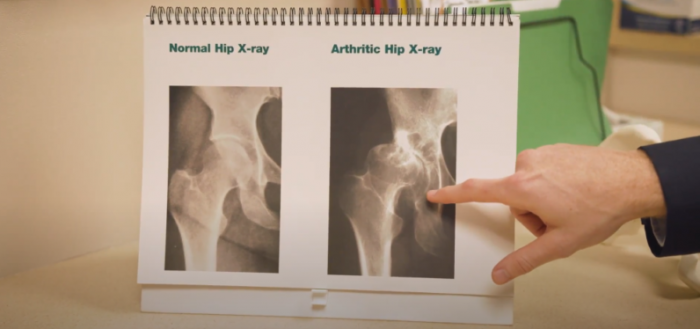
Joint pain in the hips is commonly caused by arthritis, but the type of arthritis causing the pain can vary. Within the 100 different types of arthritis, osteoarthritis and inflammatory arthritis are both known to cause hip pain, but their causes and who it affects differ greatly. Osteoarthritis of the hip is a result of “wear-and-tear” and damage to the joint’s cartilage over time. It is found to affect people later in life, whereas inflammatory arthritis can affect people of all ages with signs often starting to show in early adulthood. Inflammatory arthritis is a result of an overactive immune system causing the body to attack healthy tissues. While the causes of inflammatory arthritis are unknown, evidence has shown there to be a link between genetics and the role it plays in the development of this disease.
Those with inflammatory arthritis in their hip will most often be diagnosed with one of the following three types of arthritis:
Rheumatoid arthritis – This autoimmune disease causes a chemical substance to be produced that will attack and destroy the articular cartilage covering the bone.
Ankylosing spondylitis – Causing chronic inflammation of the spine, this arthritis can result in lower back pain and stiffness, and can affect other joints including the hip.
Systemic lupus erythematosus – Occurring mostly in young adult women, this type of arthritis can cause a higher incidence of osteonecrosis of the hip, a disease that causes bone cells to die, weaken bone structure, and lead to disabling arthritis.
Symptoms of Hip Arthritis
The symptoms of inflammatory arthritis in the hip cause pain and stiffness along with a dull, aching pain in the groin, outer thigh, knee, or buttocks. If severe enough, walking may become difficult causing a limp. Pain and stiffness can lessen with more activity, but too much activity can cause symptoms to become worse.
Nonsurgical Treatment
Inflammatory arthritis of the hip can interfere with a person’s every-day activities and their overall quality of life. While there is no cure for this disease, there are both nonsurgical and surgical treatment options that may help prevent joint destruction. The sooner treatment is started, the greater chance there is of preserving the hip joint.
The treatment type chosen depends heavily on the type of inflammatory disease being treated and the health professional providing the care. Nonsurgical treatment options can sometimes include a combination of various methods including:
- Non-steroidal anti-inflammatory drugs (NSAIDs)
- Corticosteroids
- Disease-modifying antirheumatic drugs (DMARDs)
- Physical therapy
- Assistive devices (cane, walker, long-handled shoehorn, etc)
Surgical Treatment
If a patient is a candidate to treat their inflammatory arthritis with surgery, generally the two surgical options include total hip replacement and synovectomy.
Total Hip Replacement – This type of surgery involves the removal of the arthritic surfaces of the hip joint and replacing them with total hip implants. The implants are designed to replicate the hip joint and are made with metal, polyethylene (a durable plastic), and/or ceramic. This allows the joint to move smoothly again.
Synovectomy – Synovectomy is generally used to treat the earlier stages of inflammatory arthritis. This surgery removes part or all of the joint lining (synovium) and may be effective if the disease has not yet affected the articular cartilage that covers the bones.
If the disease has progressed far enough that surgery is the only option, total hip replacement has shown to be one of the most successful operations in all of medicine. The type of surgery a surgeon chooses depends on age, condition of the hip joint, the specific disease causing inflammatory arthritis, and the progression of the disease. Both surgical treatment options have been shown to help improve function, increase motion, and relieve pain.
We’ve put together a free guide to help you better understand joint replacement preparation, surgery, and recovery. If joint replacement surgery is the best solution for you, The Center’s orthopedic surgeons and support staff are ready to help you prepare for surgery and plan for a successful recovery.
We’ve put together a free guide to help you better understand joint replacement preparation, orthopedic surgery, and recovery. If joint replacement surgery is the best solution for you, The Center’s orthopedic surgeons and support staff are ready to help you prepare for surgery and plan for a successful recovery. Click below to sign up and receive our free joint replacement guide.





